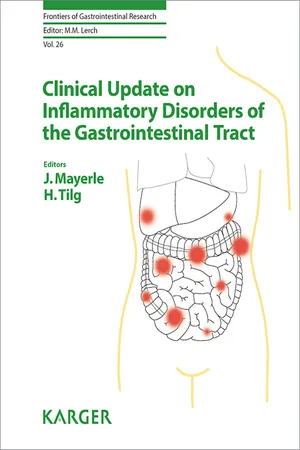
Clinical Update on Inflammatory Disorders of the Gastrointestinal Tract
- 224 pages
- English
- ePUB (mobile friendly)
- Available on iOS & Android
Clinical Update on Inflammatory Disorders of the Gastrointestinal Tract
About this book
Digestive-disease-associated mortality accounts for a major part of all deaths in Western societies and inflammatory diseases such as GI infections, viral hepatitis, GERD or cancers due to chronic inflammation have a tangible economic and social impact. What further aggravates the situation is the fact that complex immunological disorders have surfaced where anti-infective treatments are not effective. Fortunately, due to breakthroughs in basic research that are being successfully translated into clinical practice, new treatment strategies are constantly evolving. In addition to the development of new therapeutic measures, however, it is also mandatory to review and periodically refine established treatment regimens to reflect current knowledge and ensure up-to-date medical care.
Frequently asked questions
- Essential is ideal for learners and professionals who enjoy exploring a wide range of subjects. Access the Essential Library with 800,000+ trusted titles and best-sellers across business, personal growth, and the humanities. Includes unlimited reading time and Standard Read Aloud voice.
- Complete: Perfect for advanced learners and researchers needing full, unrestricted access. Unlock 1.4M+ books across hundreds of subjects, including academic and specialized titles. The Complete Plan also includes advanced features like Premium Read Aloud and Research Assistant.
Please note we cannot support devices running on iOS 13 and Android 7 or earlier. Learn more about using the app.
Information
Front Gastrointest Res. Basel, Karger, 2010, vol 26, pp 186–198
Recommendation | Level of evidence | Grade of recommendation |
| Eradication is an appropriate option for patients infected with H. pylori and investigated non-ulcer dyspepsia | 1a | A |
| Test and treat is an appropriate option for patients with uninvestigated dyspepsia | 1a | A |
| Test and treat or empirical acid suppression are appropriate options in populations with a low H. pylori prevalence | 2a | B |
| H. pylori does not cause GERD | 1b | A |
| Eradication does not affect the outcome of PPI treatment in patients with GERD in Western populations | 1b | A |
| Routine H. pylori testing is not recommended in GERD | 1b | A |
| Testing should be considered for patients receiving long-term maintenance treatment with PPIs | 2b | B |
| H. pylori eradication is inferior to PPI maintenance therapy in patients receiving long-term NSAIDs and who have peptic ulcer and/or ulcer bleeding in preventing ulcer recurrence and/or bleeding | 1b | A |
| Eradication is of value in chronic NSAID users but is insufficient to prevent NSAID-related ulcer disease completely | 1b | A |
| Eradication may prevent peptic ulcer and/or bleeding in naive users of NSAIDs | 1b | A |
Table of contents
- Cover Page
- Front Matter
- Non-Alcoholic Fatty Liver Disease
- Fibrosis in the GI Tract: Pathophysiology, Diagnosis and Treatment Options
- Chronic Hepatitis B: Pathophysiology, Diagnosis and Treatment Options
- Chronic Hepatitis C: Pathophysiology, Diagnosis and Treatment Options
- Clinical Update on Inflammatory Disorders of the GI Tract: Liver Transplantation
- Hepatocellular Carcinoma
- Coeliac Disease
- Anti-TNF Therapy in Inflammatory Bowel Diseases
- Role of Epithelial Cells in Inflammatory Bowel Disease
- GI Immune Response in Functional GI Disorders
- Probiotics in GI Diseases
- Microscopic Colitis
- Inflammatory Proteins as Prognostic Markers in Acute Pancreatitis
- Antibiotics, Probiotics and Enteral Nutrition: Means to Prevent Infected Necrosis in AP
- IKK/NF-κB/Rel in Acute Pancreatitis and Pancreatic Cancer: Torments of Tantalus
- Immunotherapy of Pancreatic Carcinoma: Recent Advances
- Helicobacter pylori Infection: To Eradicate or Not to Eradicate
- Carcinogenesis and Treatment of Gastric Cancer
- Author Index
- Subject Index